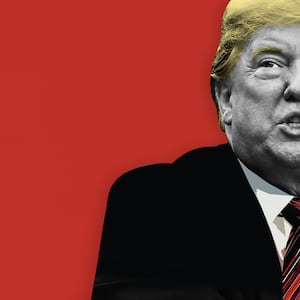Donald Trump had 35 days to convince America to support his border wall during the government shutdown. He didn’t. Next week he will have a chance to do it again, when he delivers the State of the Union Address. The odds are he won't. That's because, with all his attempts to brand himself as a marketing wizard, Donald Trump is anything but. As this reality becomes abundantly clear, it is even becoming apparent even to some of Trump’s most passionate and stubborn supporters. You always hurt the ones who love you the most.
Let’s take, for example, conservative provocateur Ann Coulter. During last week’s episode of HBO’s Real Time, when Bill Maher joked that Coulter was just now “finding out he’s a lying conman,” Coulter replied, “That was actually a selling point with Trump.”
“I find his puffery really charming,” she continued.
ADVERTISEMENT
Putting your faith in a man based on his ability to fool other people is like marrying the person you cheated with. Eventually, that person gets around to lying to….you.
Trump pulled one over on her. In essence, Coulter, who desperately wants a border wall, was SHOCKED! to learn that there’s gambling at Rick’s. Naiveté notwithstanding, she has finally stumbled upon the fundamental reason this alleged dealmaker hasn’t been able to negotiate many as president. It’s hard to do a deal with someone you can’t trust.
Years ago, a young marketing whiz named Mark Montini taught me an equation to explain the necessary ingredients for developing a persuasive message: M=EC3, or Message = Emotion x Contrast x Connection x Credibility. It’s instructive to consider this when analyzing Trump’s failures as a salesman.
So how does Trump measure up against this formula? He’s great at stoking the emotion (E) of his base (see his ability to get people stirred up at rallies) and at contrasting (C) himself from his adversaries (see his ability to win the GOP primary). But he’s deficient in the other ingredients.
By far, Trump’s greatest weakness is in the final (and most important) C, credibility. Without that last ingredient, in the long run it’s impossible to get people to buy in to your vision.
Now, for many conservatives (like Ann Coulter), Trump’s credibility rested not on his character, but on the fact that he said he would build a wall. They never stopped to think that the guy who conned others might be conning them, too. Today, Coulter is paying a high price for her misplaced trust—and she is discovering what so many of us sensed all along.
It also helps explain how—even on the rare occasion when Trump wheels out the teleprompter and tries to give a moving speech—nobody is moved. Part of a leader’s job is to persuade via rhetoric, yet outside of his credulous base Trump has consistently failed at this. His Oval Office speech was a dud, he was outmaneuvered by Nancy Pelosi (ironically over whether he could give a State of the Union speech during a shutdown!), and now he’s on the verge of losing Ann Coulter.
This situation smacks of irony: Donald Trump billed himself as the greatest salesman in the world, yet he can’t seem to sell the American public on anything.
While this doesn’t bode well for his reelection prospects, the greater danger is that this deficiency might someday transcend political concerns. What if Trump needs to deliver an important message about an actual emergency (not a contrived one). Not every political leader needs soaring rhetoric. However, all leaders must husband credibility as capital to be called upon when needed. Trump has squandered his.
Ironically, earning a reputation as a truth-teller can earn a leader some license for wish-casting. I recently listened to a speech by Churchill biographer Andrew Roberts that put this in perspective. Roberts noted that during his great “Finest Hour” speech, Churchill told the public “there are good and reasonable hopes of final victory.” But in fact “there weren’t,” Roberts admits. And so, Churchill “made up for it through his rhetoric” that boosted the morale the British citizenry would need to survive the Blitz.
We needn’t go back so far to find examples where a leader’s ability to cast a positive vision is vital to avoid existential danger—nor do we need to find an occasion as dramatic as the Battle of Britain—to illustrate why it is important for leaders to preserve the credibility and to cultivate the rhetorical ability to comfort and inspire their constituents.
Thirty-three years ago this week, Ronald Reagan postponed his own State of the Union address to instead address the nation about the Challenger disaster. For me, it was an awakening. It was the first time I had been really exposed to the reality that things were beyond the control of the “adults.” Maybe I was sheltered, or maybe it just hit me at the right age, but it had an impact. “The crew of the space shuttle Challenger honored us by the manner in which they lived their lives,” Reagan told us. “We will never forget them, nor the last time we saw them, this morning, as they prepared for their journey and waved goodbye and ‘slipped the surly bonds of earth’ to ‘touch the face of God.’"
In this conclusion of his address, Reagan employed a bit of poetry and flair. This was merely icing on the cake, even if it is sorely missed today. The real reason Reagan connected was that we sensed he meant what he said.
Donald Trump’s rhetoric doesn’t work because he lacks credibility, and he lacks credibility because he has squandered it on lies and hate tweets. This is something many of us have long known. The Ann Coulters of the world are finally figuring this out…the hard way.
I don’t find his puffery all that charming.







